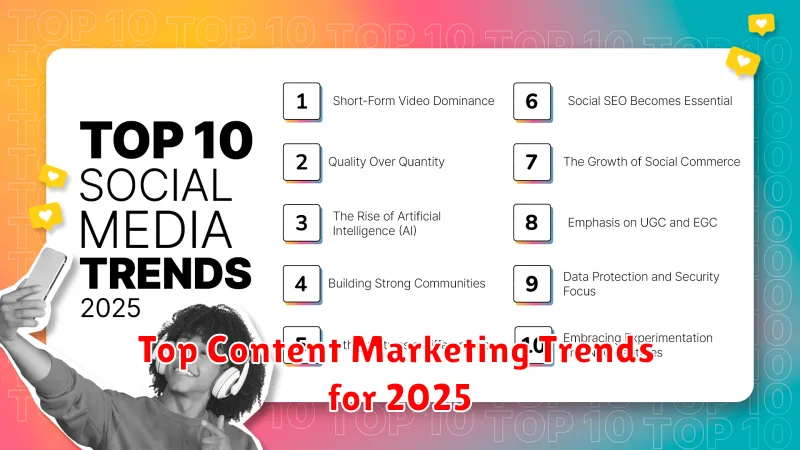The digital landscape is in constant flux, making it crucial for businesses to stay ahead of the curve. Content marketing remains a cornerstone of successful online strategies, but the tactics that worked yesterday might not resonate with tomorrow’s audiences. This article explores the top content marketing trends predicted to dominate in 2025, providing valuable insights for businesses looking to optimize their content strategies and achieve measurable results. Understanding these emerging trends will be essential for capturing audience attention, driving engagement, and ultimately achieving content marketing success in the increasingly competitive digital arena.
From the rise of artificial intelligence to the evolving demands of discerning consumers, 2025 promises a dynamic year for content marketing. This article will delve into the key trends shaping the future of the field, offering practical advice and actionable strategies for businesses to leverage. We will examine the increasing importance of personalized content, the growing influence of short-form video, and the continued evolution of search engine optimization (SEO). By understanding and adapting to these content marketing trends, businesses can position themselves for growth and maximize their impact in the digital landscape of 2025.
Focus on Value-Based Content
In 2025, content marketing will continue its evolution toward providing genuine value to the audience. Value-based content prioritizes the needs and interests of the target audience over purely promotional messaging. This means creating content that educates, informs, entertains, or solves a problem for the reader.
Moving away from sales-driven content and towards helpful resources builds trust and establishes your brand as an authority in your field. This approach fosters long-term relationships with customers rather than pursuing quick conversions. Consider what unique insights or expertise you can offer to truly enrich your audience’s experience.
Examples of value-based content include:
- In-depth guides and tutorials
- Original research and data-driven reports
- Actionable tips and advice
- Entertaining and engaging stories
By focusing on providing tangible benefits to your audience, you’ll be better positioned to capture their attention and loyalty in a competitive digital landscape.
Short-Form Video on the Rise

Short-form video continues its reign as a dominant content format. Platforms like TikTok, Instagram Reels, and YouTube Shorts are driving this trend, captivating audiences with easily digestible content. Businesses must leverage this format to reach younger demographics and stay relevant in the evolving digital landscape.
The authenticity and raw nature of short-form video resonates with viewers. This presents an opportunity for brands to connect with their audience on a more personal level. Quick, engaging content can be used to showcase products, share behind-the-scenes glimpses, and build brand personality.
Key benefits of incorporating short-form video include increased engagement, improved reach, and enhanced brand discoverability. The algorithm of these platforms favors short-form video, providing greater organic visibility compared to other content formats.
Interactive and Personalized Content
In 2025, generic content will no longer suffice. Audiences crave personalized experiences. This means tailoring content to individual user preferences, behaviors, and needs. Think dynamic content that adapts in real-time, personalized recommendations, and highly targeted messaging.
Interactive content will also be paramount. This encourages active participation from the audience, boosting engagement and fostering deeper connections. Quizzes, polls, surveys, calculators, and interactive infographics will all play a crucial role. This shift towards active participation requires content marketers to think beyond passive consumption and prioritize two-way communication.
This personalized and interactive approach will become even more critical with the continued rise of artificial intelligence. AI-powered tools can analyze user data to deliver highly targeted and relevant content experiences, further enhancing engagement and driving conversions.
Voice Search Optimization
With the proliferation of smart speakers and virtual assistants, voice search is becoming increasingly prevalent. Optimizing content for voice search will be crucial. This means focusing on long-tail keywords and conversational language.
Users employ a more natural, question-based phrasing when using voice search. Content strategists should anticipate these questions and provide direct, concise answers.
Structured data markup is essential for helping search engines understand the context of your content, making it more likely to surface in voice search results. Focusing on local SEO is also important, as many voice searches have local intent, such as finding nearby businesses.
AI-Powered Content Creation

Artificial intelligence is poised to revolutionize content creation. AI writing tools can generate various content formats, from social media posts to long-form articles, boosting efficiency and output.
While concerns exist regarding originality and the potential for robotic-sounding prose, AI tools offer powerful capabilities for content optimization. They can analyze data to identify trending topics, suggest relevant keywords, and even personalize content for specific target audiences.
Businesses can leverage AI to automate repetitive content tasks, freeing up human writers to focus on more strategic and creative work. This collaboration between humans and AI promises to enhance content quality, scale content production, and drive stronger results.
Sustainability in Storytelling
Consumers are increasingly aware of the environmental and social impact of their purchasing decisions. This heightened awareness extends to the brands they engage with, making sustainability a key factor in brand perception. Storytelling provides a powerful platform for brands to communicate their commitment to sustainable practices.
By showcasing eco-friendly initiatives, ethical sourcing, and community involvement through compelling narratives, brands can resonate with environmentally and socially conscious consumers. This resonates particularly strongly with Gen Z and Millennials, who prioritize sustainability and expect brands to reflect these values.
Transparency is paramount. Consumers are adept at recognizing greenwashing. Brands must be prepared to substantiate their claims with verifiable data and demonstrate a genuine commitment to sustainable practices throughout their operations.

